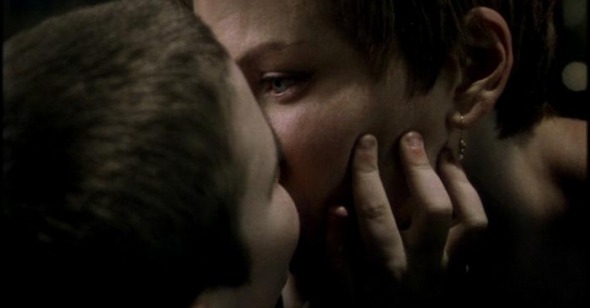The Kid Is Not My Sean
by Adam Nayman
Birth
Dir. Jonathan Glazer, U.S., New Line
With Birth, Jonathan Glazer saves critics the troubling of anointing him a filmmaker to watch—he enacts the benediction for them, with every attention-grabbing shot and ostentatious directorial gesture. A veteran of television commercials and music videos, Glazer made his feature film debut in 2001 with Sexy Beast, an attractive but vapid crime thriller that at least did a great public service in reminding the public that Ben Kingsley, when properly motivated, is a sensational actor. (See also: this year's oddball serial killer procedural Suspect Zero, similarly helmed by a high-minded filmmaker trying way too hard.)
Nicole Kidman can be sensational, too, especially when under the thrall of a Svengali-ish auteur: Kubrick and Von Trier are the obvious examples, but Gus Van Sant deserves a lot of credit for eliciting her first truly focused performance way back in 1995's To Die For. Glazer probably fancies himself just such an auteur, but unfortunately, despite his star's obvious commitment and his own startling aptitude for cinematic texture (abetted here by ace DP Harris Savides, also a former Van Sant collaborator), Birth is his second film to underwhelm.
There is nothing underwhelming about the much talked-about prologue. That's the point—it's audience-lapel grabbing of an expert and shameless sort. A long, wordless tracking shot follows a man on a winter jog in Central Park. It then shows us his death: he collapses suddenly on his way through an underpass. Then, with his first cut, Glazer gives us a just-born infant, howling soundlessly and bathed in fluid. A life begins, and a life ends, and, thanks to the preceding and enigmatic voiceover, it's a dichotomy touched by the possibility of the supernatural. Spooky.
Birth stays spooky all through its early movements. The dead jogger, we learn, was named Sean. His wife, Anna (Kidman) has during the ten years since his death harbored an intense grief that has consumed her life and alienated her from her friends. Nevertheless, she's managed to forge a relationship with clenched upper-cruster Joseph (Danny Huston), but their interaction suggests neither intimacy nor understanding. An early scene of their engagement party lays the character types out pretty bluntly: Joseph is steadfast yet awkward, while Anna is a tremulous basket case in a Rosemary Woodhouse haircut.
Kidman's deer-in-the-headlights countenance has been getting a healthy workout of late (we got nearly three hours of it in Dogville) but she's scarcely looked quite so baffled as in the scene where Anna is informed by an underage interloper (Cameron Bright) at her birthday party that he is that same Sean, back from the dead and inhabiting the body of a ten-year old boy. Spooky.
We're baffled too, of course, and pleasantly so. But also maybe less than we should be, since Glazer has already put his genre-movie cards on the table with the eerie prologue. And so the remainder of Birth plays out as a game of is-he-or-isn't-he, with little Sean doing his best zombie glare at all times (even when he's alone) and the people around Anna slowly beginning to doubt their own amusement and incredulousness. Anna is neither amused nor, really, incredulous: she makes her mind up pretty early on that Sean is who he says he is, or at least that she really, really wants him to be.
Based on his direction, Glazer really, really wants him to be, too. Birth has elicited comparisons to the films of Stanley Kubrick, owing to the glacial sense of detachment that Glazer brings to the proceedings. It's hard to discuss just why this approach doesn't work without spoiling the movie, but suffice it to say that for all of its random snatches of intelligence and inspiration, Birth is, in fact, a mirror of its prepubescent leading man/antagonist: it runs a good game for a long while before suffering a psychic break and descending into total confusion.
The final revelations are brought off with a hesitancy bordering on embarrassment; imagine if Nicolas Roeg hadn't really had something up his sleeve all throughout Don't Look Now, and you have some idea of the disappointment that Glazer's art-house horror approach winds up generating. Once we know what has actually happened, the opening scene's intimations of cosmic serendipity and reincarnation reveal themselves as cheats. This, it turns out, is a movie about psychology and motivations, which is okay (better, in fact, than the other, since the other usually manifests itself in crap like Godsend, also starring little Cameron Bright), but only if it works in the context of what has come before. Sorry, nope. Birth comes on like art-house horror gangbusters and then retreats into weak-kneed ambiguity that can't satisfy our expectations.
Glazer's ado is for naught, then. On the other hand, his faith in long takes (sometimes the duration of an entire reel, or close to it) and feeling for locations (Rosemary's Baby is invoked in setting as well as Anna's coif) shines through. If Birth is a work of conviction-that is, if Glazer believes in the pretentious twaddle he's working with-then that's one thing. If, however, he's simply laboring (as in Sexy Beast) to infuse second-rate material with aesthetic energy, than perhaps he should cut his losses, stop with these so-serious (and, for what it's worth to a commercial director, commercially doomed) genre movies, and make an out-and-out flick-some kicky, disreputable guilty pleasure not weighed down by Birth's faux-gravitas.
